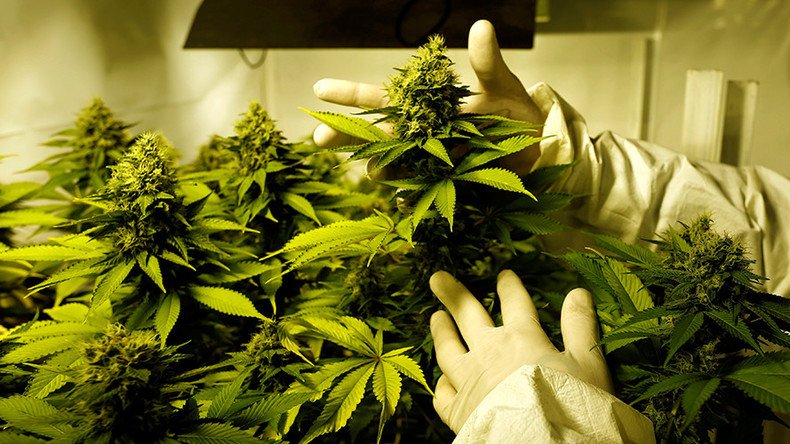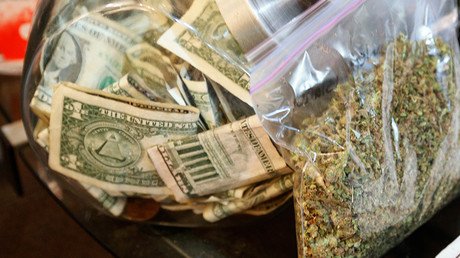Justice Dept. and DEA don’t see eye-to-eye on marijuana research & MS-13

US Attorney General Jeff Sessions is blocking marijuana research which the Drug Enforcement Administration has requested to undertake dozens of times. The DEA and the DOJ also have opposing views on tackling the so-called MS-13 gang.
The DEA started accepting applications in order to grow marijuana for research a year ago. This month, it had 25 proposals to look over. DEA officials say that they need the DOJ’s approval to move forward but has not received it yet.
“They’re sitting on it,” an unnamed law enforcement official familiar with the matter reportedly told the Washington Post. “They just will not act on these things.”
“The Justice Department has effectively shut down this program to increase research registrations,” an unnamed senior DEA official told the Post.
Rusty Payne, a spokesman for the DEA, said the agency “has always been in favor of enhanced research for controlled substances such as marijuana.”
The back and forth regarding marijuana policy is only one instance in a long line of disagreements between the DOJ and the DEA. At a time when President Donald Trump and Sessions have been taking a tough stance on drugs and crime, the DEA has quietly been questioning their decision making.
Acting DEA Administrator Chuck Rosenberg wrote an email to staff members last month, saying Trump had “condoned police misconduct” while speaking in front of police officers in Long Island, the Wall Street Journal reported.
During the speech, Trump said officers shouldn’t worry about protecting suspects’ heads while putting them into police vehicles.
The acting administrator stated that he wrote the email, “because we have an obligation to speak out when something is wrong.” After criticism from the public, the White House responded by saying that Trump was just joking.
Officials who have chosen to remain anonymous for fear of facing potential consequences have revealed details of internal disputes between the DOJ and the DEA, according to the Post.
The unnamed DEA officials said Sessions and his Justice Department began pressing the agency to take action on the MS-13 gang. Rosenberg, however, has warned the DOJ that MS-13, which primarily recruits teenagers from Central America, is not a serious threat in terms of distributing and selling narcotics. The real threat, the agency says, are the Mexican drug cartels, the Post reported.
DEA officials have directed people in their field offices to focus on the largest threat in their area. In many parts of the US, MS-13 is not a huge problem compared to other groups, the unnamed DEA officials said according to the Post.
Agency officials have warned that the Mexican cartels will use any gang to sell their drugs.
“Mexican cartels, Mexican transnational organizations are the greatest criminal threat to the United States,” agency spokesman Payne said, according to the Post. “There’s no other group currently positioned to challenge them. Whenever drug investigations that we do involve MS-13, we respond, but right now the No. 1 drug threat in the US is the Mexican cartels.’’
Department officials have been reviewing policies relating to this issue that were enacted by Sessions’ predecessor. Specifically, the DOJ is reviewing the enforcement of federal marijuana laws in states that have legalized the use of the drug.
Sessions also remains skeptical about the medicinal uses of marijuana.
“Dosages can be constructed in a way that might be beneficial, I acknowledge that, but if you smoke marijuana, for example, where you have no idea how much THC you’re getting, it’s probably not a good way to administer a medicinal amount. So forgive me if I’m a bit dubious about that,” Sessions stated earlier this year, according to the Post.
The DEA also has its problems with medicinal uses for marijuana. Last year, Rosenberg declined to remove marijuana from its classification as a Schedule 1 controlled substance. This means the agency declares the drug to have no redeeming medicinal qualities and high potential for abuse.
But Rosenberg wrote that the DEA would “support and promote legitimate research regarding marijuana and its constituent parts,”according to a DOJ document.
Rosenberg stated that the agency also had already approved research into the drug as 354 people and institutions were registered to study marijuana and related components. The studies included the effects marijuana has on humans after they smoke it.
The DEA then decided at the time to start accepting applications from people to grow marijuana so they could complete more detailed research, according to an agency document.
Rosenberg indicated in a call with the Washington Post that he would still support more research relating to marijuana even though the DOJ is not yet on-board.
“I stand by what I wrote,” Rosenberg said.
The acting administrator, who is a holdover from the administration of former President Barack Obama, also served as chief of staff and senior counselor to former FBI Director James Comey.
The only institution in the US that is currently allowed to grow marijuana for government research is the University of Mississippi.















